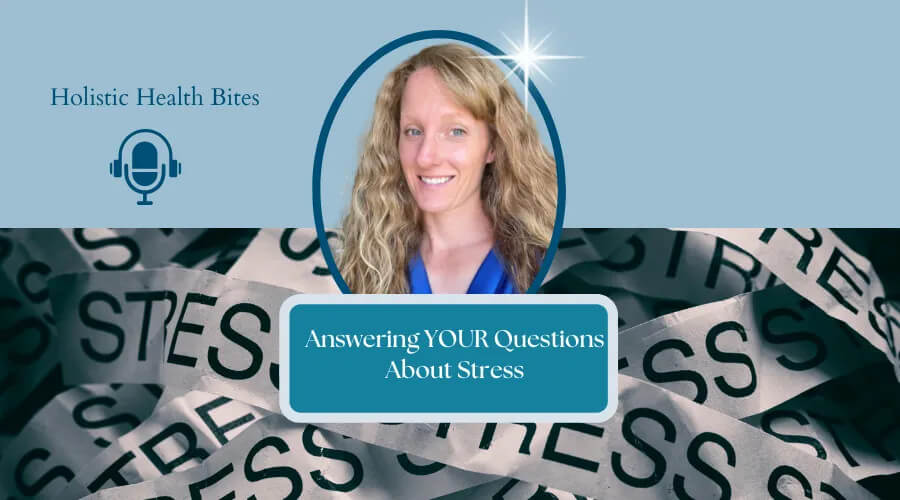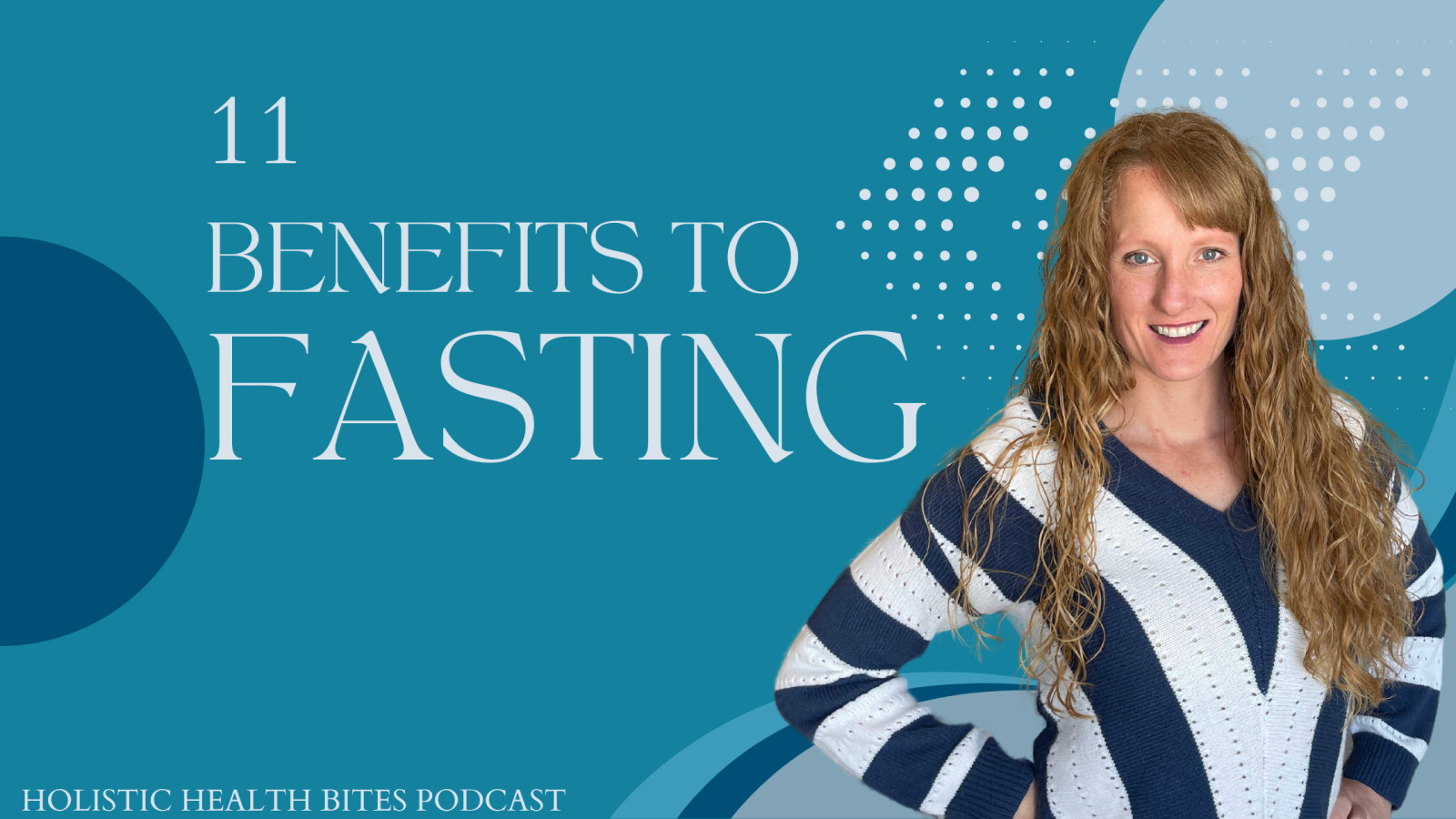
Answering your questions about stress!
“How do I lower cortisol levels?”
This is a great question. My first response is actually a question back…do you even know for sure that your cortisol is elevated? Have you done a test to know for sure because even if you’re in a stressful state, and you’re anticipating that your cortisol levels are high, because of high stress levels…you might not actually be correct in that. If you’ve been in a stressed state for a while, whether that’s an emotional stressful state, psychologically stressful state, even having an illness or inflammation in your body – those are all stressful states. If you’ve been in that state for a while, your body might actually be depleted.
The symptoms can look very similar. If you have really high cortisol or really low cortisol, they can be very similar. From a symptom standpoint, you can feel wired and tired, you can be tired all the time, and have a hard time shutting your brain off.
You really do first want to know if your cortisol levels really are high, because if they’re actually depleted and you treat them like they’re high, you will make everything way worse, and you will feel even worse than you do right now. So the first thing is I highly recommend testing.
The second thing, when you go to address your cortisol if you really do have high cortisol, is we need to know when your cortisol levels are high. This is why the testing again is so valuable because you’re actually testing at four points throughout the day. Because it’s unlikely that your cortisol is high 24 hours a day, if it is high. It’s probably high at certain points, normal at certain points and low at certain points, or any combination of the three different states. We really need to know when throughout the day are the values high? Then you can target exactly when your levels are high. We can give you specific remedies for those times a day.
That may include dietary changes, lifestyle changes, that may be supplements or even potentially medications, depending on why your cortisol is high, when it’s high, and how high it is. There’s so many factors involved in this. We need to know the details. So there are lots of different remedies, but we really need to know more detail before I can give you any suggestions.
“Can intermittent fasting help lower cortisol?”
Again, everyone’s favorite answer is it depends. Intermittent fasting can be very beneficial to help regulate the system. But fasting in and of itself is a stressor; especially if it’s new to you. So depending on your current status and stress load overall, it could be beneficial but it could also be harmful. We have to approach this from a holistic approach and you really have to understand where you’re starting.
You might need to ease into it slowly. You might need to not intermittent fast right now. You might actually need to go on a longer fast. It just really depends on so many factors. I love intermittent fasting – I think it’s a great strategy that a lot of people can implement, but it is not appropriate all the time and for all cases. So this is something we really have to dig into deeper to know for sure if it’s the right strategy for you.
“How does cortisol relate to weight and overall health?”
I love this question. And I think it’s a common question that a lot of people may know something about but don’t necessarily understand how it all correlates. There have been various commercials over the years that have talked about how cortisol adds to the belly fat and about medications and supplements that you can take to block the cortisol so that that doesn’t happen. It’s really a big topic and so to understand how it relates, you have to understand what cortisol is doing in the body.
Cortisol is required for life. It’s necessary for survival. It’s not just for fight or flight, although that’s its primary thing that we all think about. But it’s actually what wakes us up in the morning. It’s what helps control a lot of your bodily functions. It’s a required hormone in life. You have to have it to live.
The problem is most of us live in a chronically stressed out state, between work stress, relationship stress, traffic, our diets are stressful, exercise – both with over-exercising and under-exercising can be stressors and we are constantly bombarded with toxins which can be stressful to the body, infections and the immune system processes…all the things. Most of us are under too much stress, too often, from all of these different sources and all of them can cause spikes in cortisol.
Now cortisol relates to weight and overall health in many ways. One of the primary ways that it affects weight specifically is when your cortisol increases, that also triggers a release of the sugar into your blood. This happens because the body is perceiving a stressor that’s going to require some kind of action. You need increased blood sugar, so you have available energy to fight whatever the stressor is or to flee from whatever the stressor is.
The body doesn’t know the difference between a toxin causing stress or emotional stress or physical “I need to run away from this” danger. The body doesn’t know any different. So you’re getting less blood sugar spike, anticipating that you’re going to have to do some kind of action, requiring the extra energy. But most of us are actually sitting and stewing in our stress. We don’t really need that energy. But the body doesn’t know that. So you’re getting this increase in blood sugar and when you get an increase in blood sugar, especially if you are not needing the added energy, you also get a spike in insulin to deal with the high blood sugar…that you didn’t really need. Insulin is a fat storage hormone that tells the body to store any available fuel, sugar, food coming in, all of it as fat. And generally it goes to belly fat.
So that is how you end up gaining more weight when you have chronically elevated cortisol. It’s because of the increasing blood sugar, which increases insulin and insulin blocks you from burning body fat and causes you to store all of the available fuels as fat. Insulin resistance in general, which comes from having chronically elevated insulin, affects every disease process – including cardiovascular disease, cancer, vision and hearing loss, migraines, hormone imbalances… you name it, insulin resistance is involved.
So there are two major ways how high cortisol, cortisol imbalances can relate to weight and overall health.
“Can cortisol be too low? What would that feel like?”
So I addressed a little bit of this when I talked to Farrah’s question about lowering cortisol that cortisol can become depleted and be too low. This can feel like high cortisol, tired, or wired and or brain fogged. It can be dangerous because like I said earlier, is a required hormone for life.
You need it to have sufficient energy, to do a lot of your normal autonomic functions in the body. Cortisol plays a role in your heart beat, in other hormones, it plays a lot of roles throughout the body that are necessary for life. So it absolutely can be too low and also needs to be dealt with if it is too low.
“How does caffeine affect cortisol?”
This is a great question and it affects a lot of things actually. Caffeine can interact with how well you process the cortisol in the body. It can cause a spike in cortisol in some people. It can cause a blood sugar spike in some people, which can then also trigger more cortisol and they kind of feed into each other. It also can cause sort of a pooling in the body where some of the signals that cortisol would be acting on are sort of blocked while the caffeine is present. But they’re still building up. The activities aren’t occurring, nut the hormones are building.
Then when the caffeine wears off or finally gets detoxified out of the body, this extra pool gets released. That’s why sometimes people will end up with a spike in energy or a crash in energy a couple hours after having the caffeine. You have this big buildup occurring, the when the caffeine clears out, this pool is available and you have a higher load of cortisol or some of these other hormones. So it can cause problems delayed from when you take in the caffeine.
Now this is a very unique process that’s personalized to each person. Some people are very sensitive to caffeine, some people process quickly and it gets cleared out, and some people metabolize it very slowly. This is a very personalized interaction between caffeine and cortisol, but caffeine is something that can affect cortisol levels. It can cause further depletions, it can cause increases, it can cause blood sugar imbalances in some people. So you just really have to monitor how it’s working for you.
This is one of my favorite ways to test using a continuous glucose monitor. You have some coffee or some caffeine that doesn’t also have added sugars or other things that could confound the data, you can really see how caffeine is affecting you. Does it affect you immediately? Does it affect it delayed? Do you end up with a spike and then a crash? Do you end up with just a crash? Do you end up with a spike that stays high for a long time? All of these kinds of things are tremendously valuable data that you can gain from using a continuous glucose monitor.
So thank you so much for submitting these questions. I love addressing your questions specifically. Hit me up with other questions on any topic!





















0 Comments